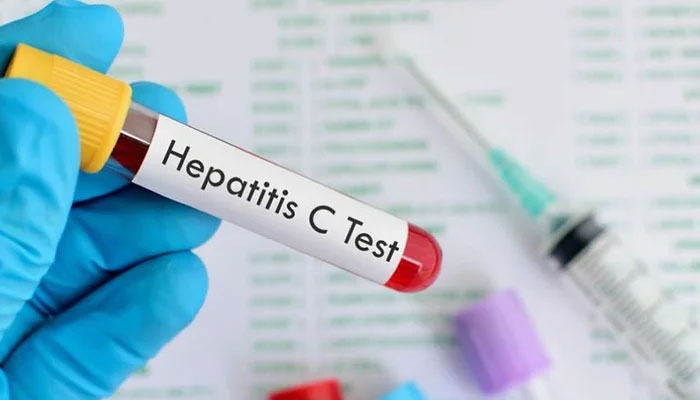Hep C emergency
Health experts estimate an 8.0 per cent and 5.0 per cent increase in hepatitis B and C related deaths, respectively, between 2015 and 2019
Pakistan has topped yet another ignominious ranking. According to a new report from the World Health Organization (WHO), Pakistan has the world’s highest total of hepatitis C infections with an estimated 8.8 million cases. And we are first by some distance, with second-placed India counting around 5.5 million hepatitis C infections. The report also shows that, taking hepatitis B and C infections together, Pakistan ranks at a somewhat more respectable fifth highest in the world with around 12.6 million infections in total. That being said, three of the four countries ranked ahead of us also have higher populations. However, what this also shows is that the prevalence of hepatitis B, the deadlier variant, is mercifully far lower in Pakistan. Nevertheless, the deaths from hepatitis B and C are still climbing. Health experts estimate an 8.0 per cent and 5.0 per cent increase in hepatitis B and C related deaths, respectively, between 2015 and 2019. Since hepatitis usually causes an inflammation of the liver, cases of liver cancer and transplants have also risen by an estimated 300 per cent over the past two decades.
So just how did the nation’s hepatitis problem reach such alarming proportions? Most new infections hepatitis B and C go undetected and that might be because symptoms are often mild or do not show up altogether. Hence, a person might be infected with hepatitis but be unaware of their condition, facilitating the spread of the virus through practices like unscreened blood transfusions, the reusing or sharing of contaminated needles in hospitals or among drug abusers. Patients only tend to become aware of their condition incidentally or after they become symptomatic, which might be years after they first become infected. Experts claim that lack of awareness is the main cause for the spread of hepatitis in Pakistan and that better treatment would not be possible without early diagnosis.
As a result, even though the generic course of treatment for hepatitis C in Pakistan is among the most affordable anywhere in the world, costing around $33 for a 12-week treatment course, many or most of the country’s patients do not even know that they need treatment until it is too late. Then there is also the fact that our healthcare system has become notorious for unsafe practices. According to a 2017 report by the International Journal of Health Policy and Management, up to 40 per cent of transfused blood in Pakistan is not screened for communicable diseases and around half of all blood transfusions are not screened for hepatitis C, B or HIV. There is not much point to having better, cheaper treatments and health facilities if the country is not actually going to expand screening for health problems.
-
 ChatGPT Caricature Prompts Are Going Viral. Here’s List You Must Try
ChatGPT Caricature Prompts Are Going Viral. Here’s List You Must Try -
 James Pearce Jr. Arrested In Florida After Alleged Domestic Dispute, Falcons Respond
James Pearce Jr. Arrested In Florida After Alleged Domestic Dispute, Falcons Respond -
 Cavaliers Vs Kings: James Harden Shines Late In Cleveland Debut Win
Cavaliers Vs Kings: James Harden Shines Late In Cleveland Debut Win -
 2026 Winter Olympics Snowboarding: Su Yiming Wins Bronze And Completes Medal Set
2026 Winter Olympics Snowboarding: Su Yiming Wins Bronze And Completes Medal Set -
 Trump Hosts Honduran President Nasry Asfura At Mar-a-Lago To Discuss Trade, Security
Trump Hosts Honduran President Nasry Asfura At Mar-a-Lago To Discuss Trade, Security -
 Cuba-Canada Travel Advisory Raises Concerns As Visitor Numbers Decline
Cuba-Canada Travel Advisory Raises Concerns As Visitor Numbers Decline -
 Anthropic Buys 'Super Bowl' Ads To Slam OpenAI’s ChatGPT Ad Strategy
Anthropic Buys 'Super Bowl' Ads To Slam OpenAI’s ChatGPT Ad Strategy -
 Prevent Cancer With These Simple Lifestyle Changes
Prevent Cancer With These Simple Lifestyle Changes -
 Air Canada Flight Diverted St John's With 368 Passengers After Onboard Incident
Air Canada Flight Diverted St John's With 368 Passengers After Onboard Incident -
 Experts Reveal Keto Diet As Key To Treating Depression
Experts Reveal Keto Diet As Key To Treating Depression -
 Inter Miami Vs Barcelona SC Recap As Messi Shines With Goal And Assist
Inter Miami Vs Barcelona SC Recap As Messi Shines With Goal And Assist -
 David Beckham Pays Tribute To Estranged Son Brooklyn Amid Ongoing Family Rift
David Beckham Pays Tribute To Estranged Son Brooklyn Amid Ongoing Family Rift -
 Jailton Almeida Speaks Out After UFC Controversy And Short Notice Fight Booking
Jailton Almeida Speaks Out After UFC Controversy And Short Notice Fight Booking -
 Extreme Cold Warning Issued As Blizzard Hits Southern Ontario Including Toronto
Extreme Cold Warning Issued As Blizzard Hits Southern Ontario Including Toronto -
 Lana Del Rey Announces New Single Co-written With Husband Jeremy Dufrene
Lana Del Rey Announces New Single Co-written With Husband Jeremy Dufrene -
 Ukraine-Russia Talks Heat Up As Zelenskyy Warns Of US Pressure Before Elections
Ukraine-Russia Talks Heat Up As Zelenskyy Warns Of US Pressure Before Elections




